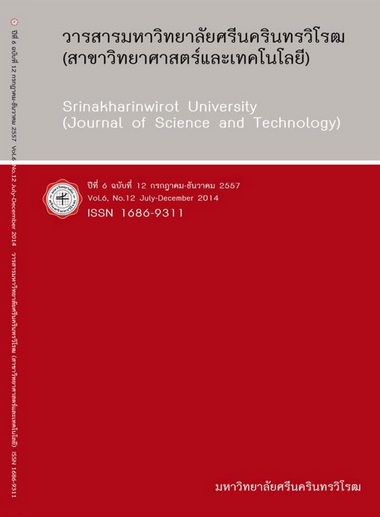ประสบการณ์ความทุกข์ทางจิตใจของมารดาที่บุตรเสียชีวิตในครรภ์ EXPERIENCE OF MENTAL SUFFERING IN MOTHERS WHO FACED WITH DEAD FETUS IN UTERO: DFIU
Keywords:
Experience, Suffering, Dead Fetus in Utero, DFIUAbstract
บทคัดย่อ
การศึกษาครั้งนี้มีวัตถุประสงค์เพื่อทำความเข้าใจความหมายเชิงลึกของประสบการณ์ความทุกข์ทางจิตใจของมารดาที่สูญเสียบุตรในครรภ์ โดยใช้วิธีการวิจัยเชิงปรากฏการณ์วิทยาแบบเฮเมนิวติก ศึกษาจากมารดาที่สูญเสียบุตรในครรภ์ จำนวน 10 ราย ที่เข้ารับรักษาที่โรงพยาบาลนพรัตนราชธานี รวบรวมข้อมูลโดยวิธีการสัมภาษณ์เจาะลึก บันทึกเทป การสังเกต การสะท้อนกลับ การจดบันทึก การวิเคราะห์ข้อมูลดำเนินไปพร้อมกับการเก็บข้อมูล ใช้วิธีการวิเคราะห์ข้อมูลเชิงคุณภาพตามหลักปรัชญา ของกาดาเมอร์ และประยุกต์ขั้นตอนการได้มาซึ่งสาระสำคัญของสมิทธ์ พบว่าการให้ความหมายความทุกข์ ทางจิตใจ ของมารดาที่สูญเสียบุตรในครรภ์ มีดังนี้
มารดาที่สูญเสียบุตรในครรภ์ จำนวน 10 คน มีอายุตั้งแต่ 20-36 ปี ทุกคนแต่งงานและอยู่กับสามี และมีบุตรที่เสียชีวิตในครรภ์ในขณะที่อายุครรภ์ระหว่าง 34-40 สัปดาห์ เป็นทารกเพศชาย 8 คน หญิง 1 คน ไม่สามารถแยกเพศเนื่องจากเสียชีวิตมาประมาณหนึ่งเดือน ระยะเวลาที่บุตรเสียชีวิตอยู่ในครรภ์ 1 วันจนถึง 1 เดือน แต่ไปสัมภาษณ์หลังมารดาสูญเสียบุตรมาแล้ว 2 เดือนถึง 3 ปี ผู้ให้ข้อมูลให้ความหมายของความทุกข์ทางจิตใจจากการสูญเสียบุตรในครรภ์ เป็นสองช่วง ช่วงแรกสามารถนำเสนอไว้ 3 ความหมายของความทุกข์ทางจิตใจ คือ 1) การไม่รู้ว่าลูกไม่ดิ้น 2) ความกังวลในสุขภาพของลูก และ 3) การชะล่าใจที่ไปตรวจช้า ส่วนช่วงหลังมี 2 ความหมาย คือ 1) อยากคลอดโดยเร็ว และ 2) อยากเห็นหน้าลูก
ผลของการศึกษามีความสำคัญต่อพยาบาลและบุคลากรสาธารณสุข เพื่อนำไปประยุกต์ใช้ใน การป้องกันและดูแลมารดาที่สูญเสียบุตรในครรภ์ โดยเฉพาะอย่างยิ่งการนับลูกดิ้นและลักษณะของการดิ้น การรีบมาโรงพยาบาลทันทีเมื่อรู้สึกว่าเกิดความผิดปกติขึ้นกับทารกในครรภ์
Abstract
The purpose of this research was to gain in-depth understanding of the meaning of suffering in mothers who faced with a dead fetus in utero: DFIU. This study used hermeneutic phenomenology as a research approach with ten mothers who lost a fetus in their womb. Data were collected by in-depth interview method and used audio-recorder. Data were analyzed from ranscription, observation, reflection, and field notes. Gadamer’s hermeneutic philosophy was
used to analyze these simultaneously as the time of data collection. Thematic analysis which applied by smith was used in the process of data analysis also.
Ten mothers who faced with dead fetus in utero ranged in age from 20-36 years. All of them were married and they lost a fetus ranged in gestational age from 34-40 weeks. The fetus included eight male, one female and one unidentified. Duration of fetal death in mothers’ uterus was one day to one month. The interviewing was conducted in couple months
There were five themes of meaning of suffering in mothers who lost a baby in their womb which separated into two phases. In first phase, the themes were 1) doesn’t know whether fetus moving or not, 2) anxiety of fetal heath, and 3) delay to go to hospital. For second phase, the themes were 1) desire to deliver the baby urgent and 2) want to see the baby. The findings lead significant implications for nurses and health care providers responsible for caring with the mothers who faced with dead fetus in utero especially baby counting and characteristic of fetal movement and also come to hospital early. to three years after they loss.
Downloads
Downloads
Published
How to Cite
Issue
Section
License
Srinakharinwirot University Journal of Sciences and Technology is licensed Under a Creative Commons Attribution-NonCommercial-NoDerivs 4.0 International (CC-BY-NC-ND 4.0) License, Unless Otherwise Stated. Please Read Journal Policies Page for More Information on Open Access, Copyright and Permissions.



